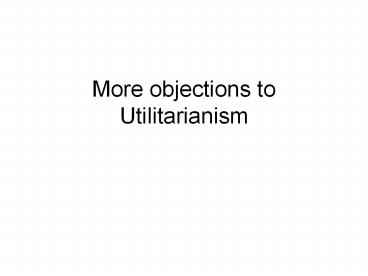More objections to Utilitarianism - PowerPoint PPT Presentation
1 / 12
Title:
More objections to Utilitarianism
Description:
More objections to Utilitarianism A common objection dismissed: Objection: If there are 101 people, Util. says that 51 of them can do whatever they want to the other ... – PowerPoint PPT presentation
Number of Views:78
Avg rating:3.0/5.0
Title: More objections to Utilitarianism
1
More objections to Utilitarianism
2
A common objection dismissed
- Objection If there are 101 people, Util. says
that 51 of them can do whatever they want to the
other 50 as long as that makes them happy. - No it doesnt. (1) the unhappiness caused by
deprivation must be factored in and (2) there are
actions open that produce more happiness.
3
Some Other common challenges
- Time (it takes too long to do a utilitarian
calculus) - Utils Response Most decisions are easy and
obvious. Many others are quickly enough made
with brief thought, still others do allow time
for extended thought. For those issues requiring
time that is not available, we must hope our
moral habits are good enough. - Inconsistency (utilitarianism is too situational)
- Utils Response One theorys inconsistency is
another theorys flexibility. To some extent we
want our moral theories to be able to consider
actions taken in different circumstances in
different ways. - Uncertainty (shouldnt we know if an action is
moral when we do it?) - Utils Response It is true that some are better
at anticipating consequences than others,
however, nobody is excused from attempting to do
so. People are often held responsible for
outcomes they did not intend. The Util. says
this is less a problem with utilitarianism than a
problem with reality.
4
Utilitarianism is too overriding/demanding
- According to a strict interpretation of Util. you
must give up any luxury possessions you have
until the point of marginal utility (that is,
give until just before it hurts). It may well be
that morality demands this of us, but the
extremity of this position gives many pause. - We will later read Famine, Affluence, and
Morality by Peter Singer
5
Utilitarianism is too impartial
- Imagine a scenario in which a stranger is
drowning, and so is your spouse. You only have
time to reach one of them. - The solution to this dilemma seems obvious to
most, but Util. provides no basis for the obvious
answer. - Bernard Williams criticizes the Utilitarian in
this situation for having One thought too many.
6
Rule-Utilitarianism
- In order to get out of objections like the time
objection and the inconsistency objection, some
Utilitarians have proposed that instead of doing
only the action which generates the greatest
utility, we ought to set up a system of rules
that most of the time results in the best
consequences. - This means that murder, rape, and pillage are
always wrong, and it takes no time at all to be a
good utilitarianjust follow the rules. - There are two main problems with this line of
reasoning, contained on the next two slides.
7
Rule-U devolves into Act-U
- It seems that Rule-Utilitarianism best
accomplishes its goals (to maximize wefare) if
there is only one rule Maximize welfare - In that case, rule-U is not even a separate thing
from act-U.
8
Utilitarianism is a poor basis for rules
- Consider a person who cheats a bit on their
taxes. They break the rules, and get the benefit
of keeping a little extra money, and nothing bad
whatsoever happens to anyone else (whats a few
hundred bucks to the US treasury?). This action
results in the best consequences. - It appears that the way to optimize utility is
not to have everybody follow the law, but instead
to make sure that as many people break the law as
possible without collapsing the system. - All rules appear to have this character in a
Utilitarian system, and thats really odd.
9
A problem with aggregating utility
- Utilizing a method of maximizing total utility in
a fully utilitarian society leads to what is
called The reprehensible conclusion which
advocates as many people as possible living at
the bare minimum.
- Utilizing a method of maximizing average utility
in a fully utilitarian society leads to what is
called The dastardly conclusion in which a
number of people sacrifice themselves to improve
the average.
10
The Reprehensible Conclusion
- To maximize total, turn this
- Into this?
11
The Dastardly Conclusion
- Maximize Average, Turn this
- Into this?
12
Study Questions
- What is tempting about Rule-utilitarianism, and
why does it ultimately not succeed? - Which of these objections if any, are strong
enough to warrant abandoning utilitarianism? Why? - How might the utilitarian defend themselves
against either the reprehensible conclusion or
the dastardly conslusion?































